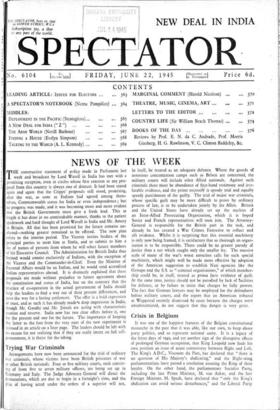Trying War Criminals
Arrangements have now been announced for the trial of ordinary war criminals, whose victims have been British prisoners of war or other British nationals. Four or five military courts, each consist- ing of from five to seven military officers, are being set up in Germany and Italy. The Judge Advocate General will direct the Prosecutions, which are due to begin in a fortnight's time, and the Pica of having acted under the orders of a superior will not, in itself, be treated as an adequate defence. Where the guards of notorious concentration camps such as Belsen are concerned, the military courts will include other Allied nationals. Against such criminals there must be abundance of first-hand testimony and irre- futable evidence, and the prime necessity is speedy trial and equally speedy punishment of the guilty. The trial of major war criminals, whose specific guilt may be more difficult to prove by ordinary process of law, is to be undertaken jointly by the Allies. Britain and the United States have already set up the nucleus of an Inter-Allied Prosecuting Organisation, which it is hoped Soviet and French representatives will soon join. The Attorney- General is responsible for the British part in the task, and already he has created a War Crimes Executive to collect and sift evidence. Whilst it is surprising that this essential machinery is only now being framed, it is satisfactory that so thorough an organ- isation is to be responsible. There could be no greater parody of justice than a net which caught only the smaller fry. The massive scale of many of the war's worst atrocities calls for such special machinery, which might well be made more effective by adoption of the American suggestion to establish Nazi agencies like the Gestapo and the S.S. as " criminal organisations," of which member- ship could be, in itself, treated as prima facie evidence of guilt. At the same time, justice should not be parodied by lack of facilities for defence, or by failure to insist that charges be fully proven. The fact that German lawyers may be employed for the defendants before military courts, and the report that an American tribunal at Wuppertal recently dismissed 62 cases because the charges were unsubstantiated, do not suggest that this danger is very great.


























